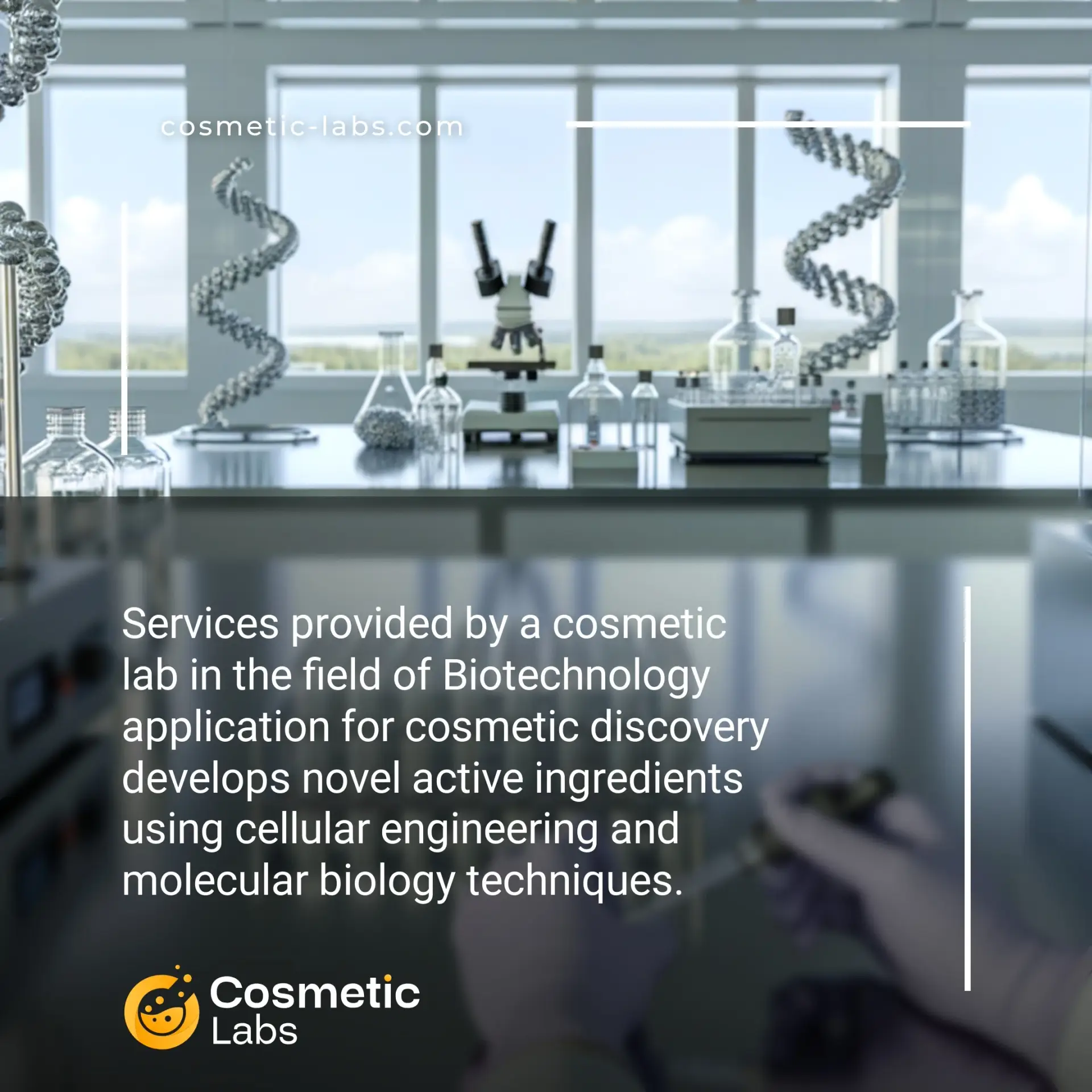Biotech Discovery Services for Cosmetic Product Development

What is Biotechnology application?
Biotechnology applications for cosmetic discovery services use living organisms, enzymes, and cellular processes to develop new beauty ingredients and formulations. Labs on our platform work with fermentation-derived actives like bakuchiol and peptides, plus bioengineered compounds that mimic natural skin proteins. These services help brands create sustainable, effective products by harnessing microbial production systems and genetic engineering techniques that traditional chemistry can’t achieve.
Why do you need this service?
Cosmetic labs on our platform use bioengineered peptide synthesis to create custom anti-aging compounds that target specific skin concerns like collagen production or melanin regulation. These services help brands develop proprietary ingredients through fermentation processes and enzyme optimization, delivering clinically proven actives that differentiate products in competitive markets while reducing reliance on traditional botanical extracts.
Who provides Biotechnology application services?
All cosmetic labs providing Biotechnology application services
There is no company providing these services at the moment.
Biotechnology Applications in Cosmetic Discovery Services
Biotech methods transform how cosmetic labs develop new ingredients and formulations during early-stage research. These advanced techniques help brands create innovative products by identifying active compounds, testing cellular responses, and optimizing ingredient performance before full-scale development begins.
Microbial Fermentation and Bioactive Compound Development
Labs use fermentation biotechnology to produce novel cosmetic ingredients through controlled microbial processes. This approach creates peptides, enzymes, and bioactive molecules that traditional chemistry can’t replicate. Fermentation produces ingredients like bakuchiol, hyaluronic acid precursors, and antimicrobial peptides.
The process involves:
- Strain selection and genetic optimization
- Fermentation parameter control (pH, temperature, nutrients)
- Downstream purification and characterization
- Stability testing for cosmetic applications
These services help brands access sustainable, high-performance ingredients that meet clean beauty demands while offering unique market positioning.
Cell Culture Testing and Ingredient Screening
Cosmetic labs apply cell culture biotechnology to test ingredient safety and efficacy without animal testing. Human skin cell models reveal how ingredients interact with keratinocytes, fibroblasts, and melanocytes. This approach accelerates ingredient screening and reduces development costs.
Key applications include:
- Anti-aging compound evaluation using dermal cell models
- Skin irritation testing with reconstructed epidermis
- Whitening agent assessment through melanocyte studies
- Barrier function analysis using transepidermal models
Labs provide detailed reports on cellular responses, cytotoxicity levels, and mechanism of action data. Connect with specialized biotech labs on our platform to explore these advanced discovery services for your next product development project.
Practical Applications of Biotechnology in Cosmetic Discovery Services
Biotechnology transforms how cosmetic labs develop active ingredients and test product efficacy through advanced cellular research and molecular analysis techniques.
Cell Culture-Based Ingredient Testing
Labs use human skin cell cultures to evaluate biotechnology applications for cosmetic discovery without animal testing. These systems measure ingredient penetration rates, cellular uptake, and biological responses within 48-72 hours. Cell-based assays provide data on collagen synthesis, melanin production, and inflammatory markers that traditional methods can’t capture.
Keratinocyte and fibroblast cultures help brands understand how peptides, growth factors, and plant extracts interact with skin cells. Teams analyze gene expression changes and protein synthesis patterns to validate anti-aging claims with quantifiable results.
Microbial Fermentation for Active Ingredient Production
Fermentation technology creates novel cosmetic actives through engineered microorganisms. Labs cultivate bacteria, yeast, and fungi to produce hyaluronic acid, ceramides, and bioactive peptides at commercial scales. This approach yields consistent purity levels above 95% while reducing production costs by 30-40% compared to synthetic alternatives.
Probiotic-derived ingredients from controlled fermentation processes offer enhanced stability and bioavailability. Labs optimize fermentation conditions to maximize yield and customize molecular weights for specific skin penetration requirements.
| Biotechnology Method | Application | Timeline | Key Benefit |
|---|---|---|---|
| 3D Skin Models | Irritation testing | 7-14 days | Human-relevant results |
| Enzymatic Synthesis | Peptide production | 2-4 weeks | Custom sequences |
| Genomic Analysis | Efficacy validation | 3-5 days | Molecular evidence |
| Biomarker Screening | Claims substantiation | 1-2 weeks | Regulatory compliance |
Ready to explore biotechnology solutions for your cosmetic development project? Connect with specialized labs on our platform to discuss your specific ingredient discovery and testing needs.
